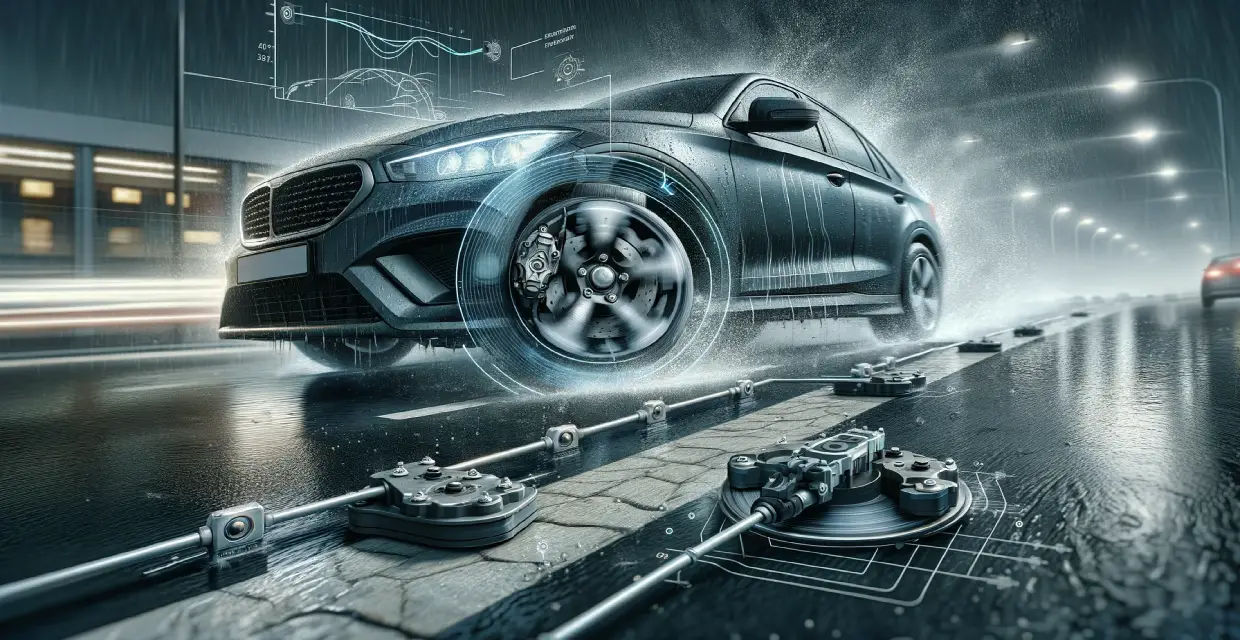

There are a lot of risks involved with driving on roads. While driving on slippery surfaces, the problem becomes even more serious. The vehicles have a risk of losing control and might flip over if the anti-lock brakes are not installed. The chances of retaining steering control for drivers can be increased by activation of anti-lock brakes. Let us discuss about this technology in detail.
ABS or Anti-Lock Braking System, is the technology which prevents the wheels of the vehicle from locking up due to emergency braking conditions, that is responsible for avoiding skidding. There are some myths attached to ABS as well. One of them is that it might reduce the stopping distance, but this is not always the case. Another very normal occurrence related to the Anti-Lock Braking System, is the vibration of the pedal during the braking.
Also Read:- What is ADAS in Cars
The solenoid valves and the electronic sensors are constantly monitoring the wheel speeds, to check whether the wheels are about to lock or not. Once the sensors sense that there is a possibility of locking, the ABS Controller reacts and changes the pressure in the braking system. Basically the sensors and the controller are responsible for automatically applying the brakes and releasing them rapidly, in order to keep the car from skidding.
The ABS or the Anti-lock Braking System consists of 4 main components which include;
ECU: The Electronic Control Unit acts as the brain for the whole system and controls the functioning of the brakes as well as takes inputs from the speed sensors.
Pumps: Responsible for changing the pressure of the braking system, via the pre-filled hydraulic fluids, resulting in movement of the brake drums or callipers when brakes are applied.
Valves: These are solenoid valves in the brake line, which allow the blocking and releasing of pressure on the brakes.
Speed Sensors: The most crucial elements are the sensors. They are responsible for tracking the decreasing rotation of the wheels and sending a signal to ECU when the brakes may cause a pause in the rotation.
Also Read:- Cheapest Cars Under 2 Lakhs
The ABS technology has currently four popular variants in use. These are discussed as under
Four Channel- Four Sensor: A unique valve and sensor are installed in every wheel. It's the most effective system since it keeps an eye on each tyre to make sure you're applying the greatest amount of brake pressure. Drivers will have better control over the vehicle's traction because the anti-lock brake system will only activate on the wheel that is ready to lock up.
Three Channel- Four Sensor: Front wheels have their own individual valves. There is only one valve that controls both of the back wheels.
Three Channel- Three Sensor: There is a sensor and a valve in each of the front wheels. A control valve and a sensor for the wheels in the rear portion.Both wheels need to lock up for ABS to activate, since the rear wheels are monitored simultaneously.
One Channel- One Sensor: Only one valve and a speed sensor are engaged in monitoring the 4 wheels. The positioning is in the rear axle and as is typically used in Pickup Trucks.
Also Read:- Ranbir Kappor Car Collection
ABS is an excellent technology and is very commonly used in vehicles these days. Some of the pros include:
Enhanced Braking Performance: ABS is responsible for improving the braking performance as well, by adjusting the force applied to the brakes. This also improves the stopping distances as well.
Tyre longevity: ABS reduces uneven tyre wear and prolongs the life of tyres by reducing wheel lock-up.
Makes Integration Easier: Since ABS and TCS share core components, incorporating traction control into car production is made much easier.
Less Maintenance Required: Anti-lock Brake Systems (ABS) can reduce the wear and tear of tyres which eventually reduces maintenance costs.
Emergency steering control: Anti-lock Braking Systems (ABS) allow drivers to keep control of the steering wheel even when applying severe brakes, which helps them to safely and quickly manoeuvre around obstructions.
Also Read:- 4 Cylinder Cars in India
Each coin has two sides, and it is viable to have disadvantages. Some of the pros of this extremely important technology are listed as follows.
Variable Braking Performance: The effectiveness of this technology also depends on the surface, which leads to inconsistent braking distances in different terrains.
Increased System Complexity: The intricate setup which involves Electronic Control Unit (ECU) and various sensors adds complexity to the overall system, potentially raising maintenance and repair costs.
High Maintenance Expenses: These can be costly to maintain as they consist of complex components and specialised requirements when it comes to servicing.
Ultimately, ABS revolutionises vehicle safety by preventing wheel lock-up while braking, allowing drivers to keep control while reducing stopping distances. Despite some limitations, its widespread use and demonstrated effectiveness make it an essential feature, considerably improving road safety for all drivers. Stay tuned with the Park+ blog for more such content.